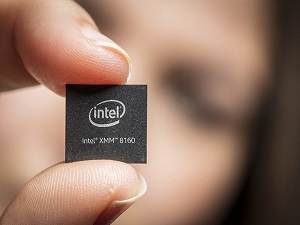



Date:13/11/18
 2019 is shaping up to be a big year for 5G, and Intel — one of tech’s biggest mobile players — has finally announced its plans for the next-generation network in the form of its new XMM 8160 5G modem. The XMM 8160 modem is set to be released to manufacturers sometime in the second half of 2019, with the first devices using the chip coming in early 2020.
2019 is shaping up to be a big year for 5G, and Intel — one of tech’s biggest mobile players — has finally announced its plans for the next-generation network in the form of its new XMM 8160 5G modem. The XMM 8160 modem is set to be released to manufacturers sometime in the second half of 2019, with the first devices using the chip coming in early 2020.
Intel has big ambitions for the XMM 8160 5G. It envisions using it across phones, PCs, and broadband hubs, with peak speeds of up to 6 gigabits per second. The modem will support both the standalone and non-standalone specs for the 5G NR (New Radio) standard, as well as legacy support for 4G, 3G, and 2G networks all in one chipset. Additionally, Intel says that the modem will support both millimeter wave (mmWave) spectrum as well as lower-band parts of the spectrum.
Intel may have a lot of catching up to do when it comes to getting companies to actually use its 5G modem, though. Currently, at least 18 major companies — including Samsung, Nokia / HMD, Sony, Xiaomi, Oppo, Vivo, HTC, LG, Asus, ZTE, Sharp, Fujitsu, and OnePlus — are working with Qualcomm and its Snapdragon X50 5G NR modems. Huawei and Samsung are both also working on their own in-house 5G modems, too.
The interesting outlier here, though, is Apple: the company recently switched to using Intel modems exclusively for its 2018 iPhone XS and XR phones (specifically, Intel’s XMM 7560 modem). And Apple is reportedly planning on sticking with Intel’s chips for whenever it does make the jump the 5G. That is said to be with its 2020 iPhone models, which would make sense if Intel releases the modem to hardware partners in late 2019.
Intel’s new 5G modem might power Apple’s first 5G iPhones
 2019 is shaping up to be a big year for 5G, and Intel — one of tech’s biggest mobile players — has finally announced its plans for the next-generation network in the form of its new XMM 8160 5G modem. The XMM 8160 modem is set to be released to manufacturers sometime in the second half of 2019, with the first devices using the chip coming in early 2020.
2019 is shaping up to be a big year for 5G, and Intel — one of tech’s biggest mobile players — has finally announced its plans for the next-generation network in the form of its new XMM 8160 5G modem. The XMM 8160 modem is set to be released to manufacturers sometime in the second half of 2019, with the first devices using the chip coming in early 2020.Intel has big ambitions for the XMM 8160 5G. It envisions using it across phones, PCs, and broadband hubs, with peak speeds of up to 6 gigabits per second. The modem will support both the standalone and non-standalone specs for the 5G NR (New Radio) standard, as well as legacy support for 4G, 3G, and 2G networks all in one chipset. Additionally, Intel says that the modem will support both millimeter wave (mmWave) spectrum as well as lower-band parts of the spectrum.
Intel may have a lot of catching up to do when it comes to getting companies to actually use its 5G modem, though. Currently, at least 18 major companies — including Samsung, Nokia / HMD, Sony, Xiaomi, Oppo, Vivo, HTC, LG, Asus, ZTE, Sharp, Fujitsu, and OnePlus — are working with Qualcomm and its Snapdragon X50 5G NR modems. Huawei and Samsung are both also working on their own in-house 5G modems, too.
The interesting outlier here, though, is Apple: the company recently switched to using Intel modems exclusively for its 2018 iPhone XS and XR phones (specifically, Intel’s XMM 7560 modem). And Apple is reportedly planning on sticking with Intel’s chips for whenever it does make the jump the 5G. That is said to be with its 2020 iPhone models, which would make sense if Intel releases the modem to hardware partners in late 2019.
Views: 404
©ictnews.az. All rights reserved.Similar news
- Azerbaijani project to monitor disease via mobile phones
- Innovative educational system to be improved under presidential decree
- NTRC prolongs license of two TV and radio organizations for 6 years
- Azerbaijan establishes e-registry for medicines
- Azerbaijani museum introduces e-guide
- Nar Mobile opens “Nar Dunyasi” sales and service center in Siyazan city
- International conference on custom electronic services held in Baku
- OIC secretary general to attend COMSTECH meeting in Baku
- Azerbaijan develops earthquake warning system
- New law to regulate transition to digital broadcasting in Azerbaijan
- Azerbaijani State Social Protection Fund introduces electronic digital signature
- Intellectual traffic management system in Baku to be commissioned in December
- Tax Ministry of Azerbaijan started receiving video-addresses
- World Bank recommends Azerbaijan to speed up e-service introduction in real estate
- Azerbaijan to shift to electronic registration of real estate





















